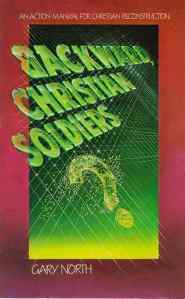Sometime back in the early 1990s, I read Gary North’s Backward Christian Soldiers: An Action Manual for Christian Reconstruction.
It was one of several of Gary’s books that I began to acquire and read one by one as I began to “reconstruct” my worldview as well as my theology and eschatology.
It is one thing to be a conservative evangelical Christian and have hope for the future.
It is quite another to be one and have hope for the present.
That’s where the majority of evangelical and Reformed Christians find themselves. It’s where they found themselves three decades ago.
Stuck somewhere between waiting for the Rapture and waiting for the world to keep on sliding into the cultural and moral abyss, with the Church doing its best to hold on to its not-so-solid ground.
In 1984, Gary offered the Church something better.
An ‘action manual’ for VICTORY on the field of battle.
A small book introducing Christians to a “positive, optimistic way of thinking” about the world around them. An alternative to the doom-and-gloom, prophetically-challenged pessimism that ruled the airwaves–and printing presses–almost exclusively back in the 1980s. I remember it so well!
Recently–as recently as the last two weeks–I acquired several (10) fresh copies of this book, Backward, Christian Soldiers, which I plan to give away. “Fresh” is a relative term, though. These are original editions left over from the second printing of the book: 1986. So they’ve been around awhile. Unsold. (Until two weeks ago.)
That, by the way, is a testimony to the overall reticence and reluctance of evangelical Christians en masse to heed such a “positive, optimistic” message of “victory” for the Church–especially one that posits this victory as taking place, progressively, prior to the Lord’s return. Eschatological heresy!
I’ll be taking a closer look at Gary’s book here, unpacking its contents and pulling out whatever nuggets of proactive, biblically-based optimism that I can.
Don’t let the title fool you. Gary knows how to wield a catchy headline (or book title). It’s meant to startle Christians into realizing that, for the last century or more, we’ve been marching backwards, away from the conflict and out of the war, culturally speaking, the entire regiment beating a retreat in the face of humanism’s relentless onslaught.
The victory spoken of in this book is not just the victory over indwelling sin that all believers agree has already been won. It’s the victory over the effects of sin in every area of life.
It can be done. Not perfectly, of course. Perfect victory over personal sin comes only on the day of a person’s death, or on the day of resurrection, whichever comes first. Perfect victory over the effects of sin throughout the universe comes only at the day of judgment. But progressive victory over sin in the individual’s life can and should be mirrored in the progressive victory over the effects of sin in the society.
As Gary points out, this is the message of Deuteronomy 8 and 28:1-14. (Take a look at those passages. They’re still relevant.) The victory of the one in Christ as well as the victory of the many.
He talks in his introduction about “social sanctification.” Something we individualistic Christians tend to find a foreign-sounding phrase. It is the “leavening influence” that the presence of believers exerts on a culture.
As godly people begin to restructure their behavior in terms of what the Bible requires, the world about them begins to change. They serve as leavening influences in the whole culture. As more converts are added to the rolls of the churches, and as these converts begin to conform their lives to the Bible’s standards for external behavior, all of society is progressively sanctified- set apart by God for His glory, just as He set apart Israel in Old Testament times.
That last point underscores where Christian Reconstructionists sometimes part company with others in the evangelical camp, finding some (but not much) comraderie and kinship with those in the Reformed camp through covenant theology: the continuity of the ethical and moral precepts of the Old Testament, with their commensurate blessings and curses for corporate and individual obedience and disobedience.
That is what our victory is based on.
More on Backward, Christian Soldiers in the next post.
